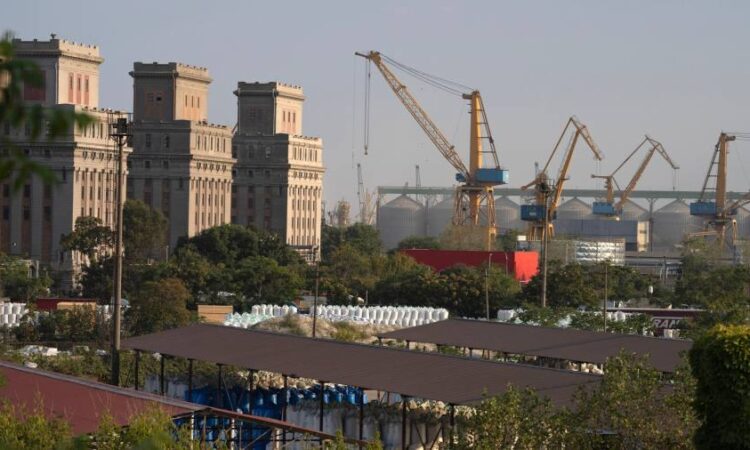
Receive free War in Ukraine updates
We’ll send you a myFT Daily Digest email rounding up the latest War in Ukraine news every morning.
Romania will double the capacity of its main Black sea port and Danube shipping lanes within two months to help Ukraine ship its grain out of Russia’s reach, according to the country’s prime minister.
Marcel Ciolacu told the Financial Times his plan would be implemented irrespective of Russian attacks on Ukrainian ports on the other side of the Danube river on the border with Romania.
“Ukraine will have about 40mn tons of grain for export in 2023,” Ciolacu said. “In order to [facilitate] that, we have increased the capacity both in Constanța harbour and the pathways leading to Constanța harbour to make this happen. We mobilised to the best that we could.”
The Romanian pledge to boost the shipping corridor by dredging the Danube and expanding ports’ infrastructure comes after Russia backed out of an agreement allowing Ukrainian grain to reach global markets through the Black Sea. Moscow has also threatened commercial vessels leaving Ukrainian ports, prompting a rerouting of exports via the Danube.
“We have learned our lessons on Russia well,” Ciolacu said. “We are at zero dependency on Russian energy or resources. Our support to Ukraine is unconditional.”
In his first interview with international media since becoming prime minister in June, Ciolacu said Bucharest would not be intimidated by Moscow and expressed confidence that his country’s Nato membership would deter Russia from any direct hostilities.
“There is no security risk for Romania at this moment,” he said.
The increased capacity of the Black Sea port of Constanța and other routes will allow Ukrainian grain exports to double to 4mn tonnes a month, he said. “Investments are under way in the Sulina channel,” he added, referring to Romania’s main deepwater shipping lane through the Danube delta.
Despite repeated Russian attacks on Ukraine’s grain silos in the ports of Izmail and Reni along the Danube river, he said there were “solutions” — for instance by allowing ships to transit by night from October and increasing freight traffic to a minimum of 14 vessels a day. Doubling the size of the barges as well “means Ukraine won’t have to use grain warehouses as much”, he said.
Shipping industry figures told the FT the plan was feasible.
Romania will also open more road border crossing points and improve its rail infrastructure at stations bordering Ukraine to accelerate the transfer of cargo, Ciolacu added.

Romania has been tight-lipped about military assistance to Kyiv, but Ciolacu said its partners knew Bucharest provided much more than humanitarian aid and logistical support. The country is also involved in preparing Ukrainian pilots to fly a growing fleet of F-16 fighter jets donated by Nato members and is awaiting the necessary documents authorising their training to start.
“I expect to sign the protocols [for the pilots] in the next few days, which is the last remaining hurdle,” he said. “The logistics are in place, as far as we are concerned.”
Increased military and infrastructure spending linked to the war in Ukraine has an impact on the country’s budget, he said. The Romanian central bank has projected the budget deficit will jump to 7.5 per cent of gross domestic product this year, far above a 4.4 per cent target and 6.2 per cent in 2022.
Ciolacu will meet EU officials in Brussels this week to discuss measures to contain the funding gap. He said “there is no way” the EU would reduce funding to Romania to force more austerity on Bucharest.
“We have had to reorganise the budget to aid the Ukraine shipments,” Ciolacu said, adding he would try to get an EU nod to account for war-related items outside the deficit calculations. “These were unforeseen expenses . . . so we will need an exemption from the fiscal code.”
Russia’s war in Ukraine has also posed security risks to Romania’s close ally Moldova, whose EU application Bucharest supports wholeheartedly, Ciolacu said. “Moldova is by far the most vulnerable state in Europe.”
His Hungarian counterpart, Viktor Orbán, has used his veto in the EU and Nato to hold up various membership applications, in a bid to force Brussels to release frozen EU funds, Ciolacu said.
“[Hungarians] speculate with this,” he said, adding it was wrong to politicise such strategic matters.
“There is a war between a dictator and the free world . . . one that Europe cannot afford to lose.”






